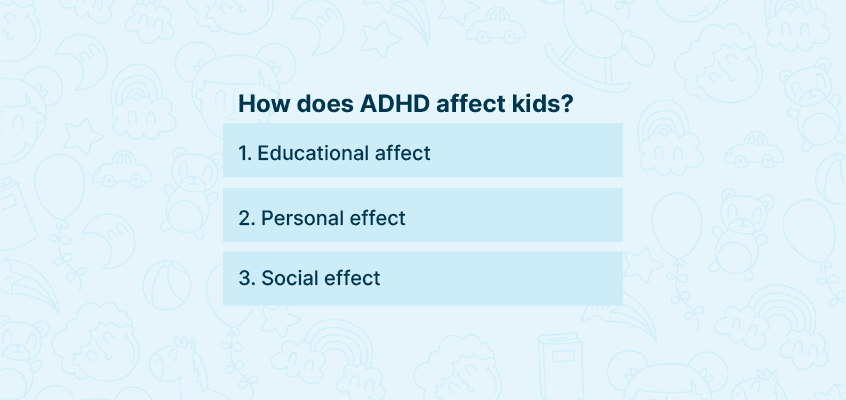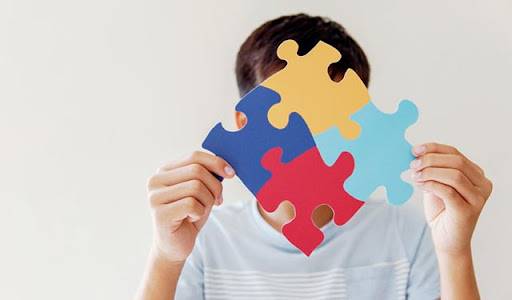What is ADHD?
One of the most frequent mental diseases affecting children is attention deficit hyperactivity disorder (ADHD). Unfortunately, many adults also have ADHD. Impulsivity is hasty acts that occur at the moment without thought. Inattention is the inability to maintain concentration. Hyperactivity is an excessive movement that is inappropriate for the situation. So these inattention, hyperactivity, and impulsivity are all symptoms of ADHD.
Main symptoms of ADHD[2][3]
- Impulsivity
- Hyperactivity
- Inattention
It is common for children to have difficulty focusing and behaving rightly at some point in their lives. ADHD kids, on the other hand, have hyperactivity and inattention that are considerably higher than usual for their age, causing unhappiness or issues functioning at home, at school, or with friends.
Signs and Symptoms of ADHD[2][3]
Knowing the symptoms can help identify the issues early and treat them promptly with proper care. Children with ADHD might suffer from some or all of the following symptoms:
- Excessive daydreaming
- Forgetful behaviour or losing their things
- Constant fidgeting
- Talking too much
- Taking unnecessary risks
- Having problems in socialising
How does ADHD affect kids?
The developmental effects of ADHD in children might include:
- Educational affect – ADHD children generally have trouble following instructions. They cannot focus on a single task for long periods. These factors can cause significant issues for children and their academic growth in a school or similar educational setting.
- Personal effect – In homes where the children have ADHD, family troubles are typical. In such a situation, the youngster may feel uncomfortable in their own home. In addition, a fulfilling parent-child connection may also be challenging for the youngster. It may cause the child to become hostile.
- Social effect- ADHD makes it difficult for children to have a fulfilling social life. It can affect the ability of children to develop social skills. It is also common for children with ADHD to have difficulty bonding with their siblings.
Read more about What Causes Lack of Social Skills In Kids?

Parenting tips for kids with ADHD
Here are some parenting tips for ADHD kids to make your and your kid’s life easier:
1. Set up a reward system for good behaviour
Organised systems of rewards are particularly effective for children with ADHD. It is essential to explain what will happen if the rules are followed and broken. For example, tell your child you will reward them once a particular task is finished, then follow through. If you are consistent with expectations and rewards, your child will be more motivated to complete the job.
2. Set up a reward system for good behaviour
Your ability to help your child deal with the obstacles of ADHD is largely down to your positive attitude and common sense. When you are calm and focused, you are more likely to connect with your child, which will help them be clear and focused.
Remembering that your child’s behaviour could indicate a disorder is one of the most important parenting tips for ADHD. Usually, these behaviours aren’t intentional. However, do not lose your sense of humour. Ten years later, what seems embarrassing today might be a humorous family story.
3: Give your child structure and routine
One of the important parenting tips for an ADHD child is to set a time and place for everything. It helps the kid understand and meet expectations. They fixed predictable and straightforward timings and rituals for meals, homework, play, and bedtime. Before going to bed, help your child lay out clothes for the next day and place anything they need to take to school in a particular place, ready to grab.
4. Have an action plan for when things go wrong
According to the American Academy of Paediatrics, a behaviour management plan should be the primary intervention for preschool-aged children with ADHD because several studies have proven how effective it can be. It may be time for a behaviour intervention plan if your child acts out, interrupts, screams, or loses academic focus. Hence, prepare an organised action plan to assist your youngster in learning how to control negative impulses and reinforce positive behaviours.
5. Be consistent in your discipline style
As the rewards, dire behaviour consequences should be reasonable and fair. Like other components of the child’s schedule, the repercussions for bad behaviour should be predictable and constant. It is an opportunity for parents to help their children learn skills valuable for years to come to manage impulsiveness and inattention.
6. Keep the communication open
Kids with ADHD have more difficulty communicating than children without the disorder. For example, they may struggle to see another person’s point of view, have issues remembering information, and have difficulty listening due to distractions.
Supporting your child with open dialogues about their feelings is one of the most widely recommended parenting solutions for ADHD. It is critical to schedule time with your child and encourages them to express anything they might feel. Handling these situations may not be your area of expertise, so remember that all feelings do not have to be positive. Allow your child time and space to express their feelings without jumping to conclusions or dismissing their viewpoint.
Allowing your child to know that you, too, experience stress on occasion will help normalize their feelings and create a safe space for them to share with you.
7. Include fun activities
ADHD children suffer from Sensory Processing Disorders, so they have difficulty connecting everyday sensory information with the required motor skills. Your youngster may get overwhelmed, worried, or have meltdowns as a result of this. One of the most important parenting tips for ADHD is to include some fun in their lives, which will also help keep up your and your child’s mental health. The best activities for kids with ADHD are those that help them gain confidence and success, burn calories, and reinforce the methods they’ve learned in behavioural therapy. Memory games, mindfulness activities, and even physical sports like karate are examples of these.
If you want to learn about additional treatment options for children with ADHD or Anxiety, you can get help from the online mental health portal United We Care. We have trusted counsellors and mental health professionals!
[1]“Attention deficit hyperactivity disorder (ADHD),” nhs.uk. [Online]. Available: https://www.nhs.uk/conditions/attention-deficit-hyperactivity-disorder-adhd/. [Accessed: 08-Aug-2022].
[2]S. Watson, “ADHD inattentive type: Symptoms, causes, and treatment,” WebMD. [Online]. Available: https://www.webmd.com/add-adhd/childhood-adhd/adhd-inattentive-type. [Accessed: 08-Aug-2022].
[3]S. Watson, “ADHD hyperactive-impulsive type: Symptoms, causes, and treatment,” WebMD. [Online]. Available: https://www.webmd.com/add-adhd/childhood-adhd/adhd-hyperactive-impulsive-type. [Accessed: 08-Aug-2022].
[4]“Attention-deficit/hyperactivity disorder in children and teens: What you need to know,” National Institute of Mental Health (NIMH). [Online]. Available: https://www.nimh.nih.gov/health/publications/. [Accessed: 08-Aug-2022].












